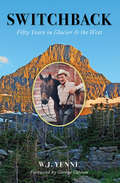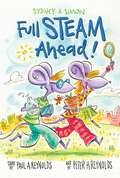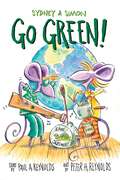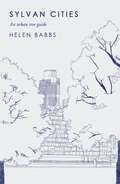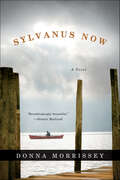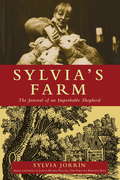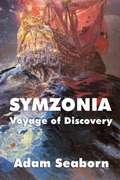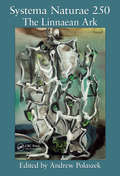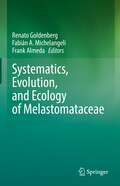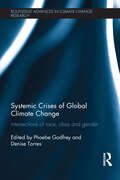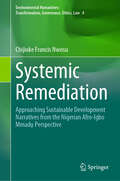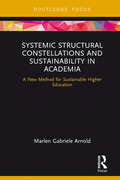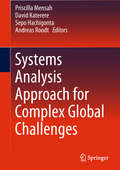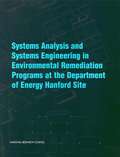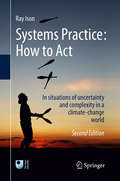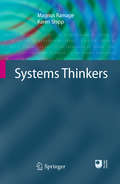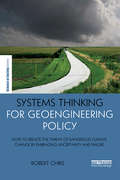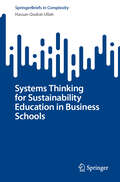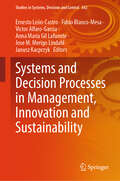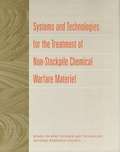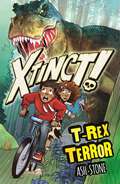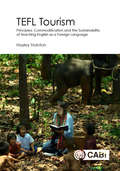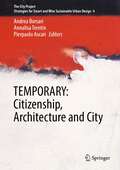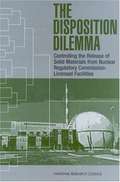- Table View
- List View
Switchback: Fifty Years in Glacier & the West
by W.J. YenneHis half-century career took him from the Idaho panhandle to the Grand Canyon, but William J. Yenne is best remembered for his decades in Montana's Glacier National Park. Widely recognized as the most accomplished and knowledgeable outdoorsman to ride the Glacier backcountry, Yenne knew each mile of the park's trails intimately and could identify every mountain peak at a glance. He was also a renowned storyteller. Many recall his amusing and fascinating yarns, spun around campfires or from his saddle on long trail rides. Those iconic tales and more are preserved in this expanded edition, updated with previously unpublished photos and stories transcribed from conversations and letters to friends.
Switchers (Switchers #1)
by Kate ThompsonWhen freakish weather grips the Arctic regions and moves southward, an Irish girl and her strange companion save the world from disaster through their ability to switch into animal forms.
Sydney & Simon: Full Steam Ahead! (Sydney & Simon #1)
by Paul A. ReynoldsTwin mice solve a problem using STEAM in this early chapter book for young artists, inventors, and creative thinkers—featuring illustrations from the award-winning author/illustrator of The Dot Sydney and Simon are twin mice on a mission. They want to enter their flowers in the neighborhood flower show, but the flowers in the window box are wilting in the city heat, and the window is jammed. How are they going to get water to their blossoms so they'll live and flourish in time for the show? Sydney and Simon are lucky to be growing up in a curious and creative family and are encouraged to ask questions, experiment, and record their findings through writing, art, music, and video. Their mother is a scientist and their father is a poet. Their family motto is: "When the going gets tough, the creative get going." Utilizing the S.T.E.A.M. (Science, Technology, Engineering, Arts, and Math) philosophy of learning, this brightly illustrated story shows how an interdisciplinary studies model helps Sydney and Simon achieve their goals. In a practical, fun, and hands-on way, young readers will be inspired to interact with their own natural learning skills and start experiencing the world-and their education-in a whole new way.
Sydney & Simon: Go Green! (Sydney & Simon #2)
by Paul A. ReynoldsSTEAM problem-solvers and twin mice Sydney and Simon learn about the dangers of pollution—and the power of recycling—in this illustrated chapter book for young readers Last we saw them, Sydney & Simon used science, technology, engineering, arts, and math skills to save wilting flowers in their window box. Now the twin mice are back to apply STEAM thinking to recycling! During a class field trip to the Aquarium, Sydney is upset when she realizes that a green sea turtle has been harmed by garbage that made its way to the ocean. She must convince Simon that even if others don&’t intend to litter, the garbage everyone puts in a trashcan may accidentally get swept into sewers, streams, rivers, and possibly end up in the ocean. The twins collects data on the trash habits of their household and school and find they are all part of the problem! They need to figure out a way that their family, their neighborhood, and their school can cut down on garbage production and make better use of their discarded items. Short chapters paired with Peter H. Reynolds&’s lively illustrations will inspire readers to take a closer look at their recycling habits and implement small changes to make a big difference.
Sylvan Cities: An Urban Tree Guide
by Helen Babbs"Clever, pretty, fun and informative—what more can a reader ask for?" —Sara Maitland, author, Gossip From the Forest We're surrounded in cities by trees, quiet colossuses that most of us don't know by name. Does that matter? It's certainly possible to appreciate a tree for its beauty, its shade, and its shelter without knowing whether it's an alder, an elder, a lime, or a beech. But look harder, and we begin to see the beauty beneath the bark—the tales of how trees are integral to medicine and art as they are furniture and firewood; the stories of why wild figs grow on the banks of Sheffield's rivers and why the ash tree is touched with magic and mischief. As well as being an illustrated guide that will help you identify some of the species you see around town every day, Sylvan City is also a potted-journey through our cities' woody places and a literary hunt for where their wild things are. Inviting readers on an intricately illustrated journey into the urban forest, Sylvan City is both a practical guide to identifying 20 of the most common trees standing sentry on our street corners, and a lyrical, anecdotal treasure trove of facts and history, culture, and leafy lore.
Sylvanus Now: A Novel
by Donna Morrissey"Breathtakingly beautiful." —Alistair MacLeodOn the coast of the great, 1950s Newfoundland fishing banks, Sylvanus Now is a rugged fisherman who treasures the traditions of his small village and his time alone with the vast sea. But when he sees Adelaide, a fiery, proud beauty from a neighboring outport, he is mesmerized and steadily pursues her. Adelaide dreams of escaping across the seas and becoming a missionary, but she is more eager to escape her squealing young brothers and sisters. She soon marries Sylvanus, and the mismatched couple is forced to face one of the great environmental catastrophes of our time: the collapse of the largest fishing grounds on earth.Through this story of love, loss, and transformation in a dissolving community, Donna Morrissey plumbs the depths of authentic relationships and breathes potent life into the ravaged Newfoundland landscape.
Sylvia's Farm
by Sylvia Jorrin Joshua Kilmer-Purcell"For those unfamiliar with Sylvia, discovering her stories is like stumbling into a fully loaded wild blackberry patch--impossible to rush through, sweetly fulfilling, with an immediate longing to return to them again and again."--Joshua Kilmer-Purcell, The Fabulous Beekman BoysThis collection of stories chronicling Sylvia Jorrín's life on the farm provides comfort and inspiration to all those searching for meaning in life's many blessings.The world of Sylvia's Farm is a rich landscape of natural beauty and simple pleasures. Sylvia Jorrín never expected to become the first woman in the New York City Watershed to solely own and operate a large livestock farm. But first the farm, and then farm life, captured her heart as it has captured the hearts of all those who have read her book. Through unexpected surprises and unanticipated hardships, Sylvia Jorrín has grown into the epitome of the one thing she never expected to be: a farmer.With a devoted following of readers inspired by her underlying appreciation of the world around her, Sylvia's Farm is the sort of ageless story that any reader can pick up and enjoy. Sylvia's Farm is, to quote Kirkus Reviews, "The delight-filled education of an out-of-the-clue shepherdess...." consisting of "....fine-grained, honest rural sketches, on a par with Noel Perrin and Don Mitchell."Sylvia's Farm is a contemporary account of rural farm life and all of the sometimes beautiful, always meaningful lessons that it continues to teach. Told in short vignettes that span over more than a decade, it is a journal of growth, persistence, and the unexpected joys that a new day can bring.
Symzonia
by Adam SeabornSymzonia: Voyage of Discovery is a breath taking adventure story that follows Captain Seaborn's expedition to the North Pole and his discovery of the entrance to the hollow earth. But first Seaborn must survive many exciting seafaring adventures including a mutinous crew.
Systema Naturae 250 - The Linnaean Ark
by Andrew PolaszekThe advent of relational databasing and data storage capacity, coupled with revolutionary advances in molecular sequencing technology and specimen imaging, have led to a taxonomic renaissance. Systema Naturae 250 - The Linnaean Ark maps the origins of this renaissance, beginning with Linnaeus, through his "apostles", via the great unsung hero Charl
Systematics, Evolution, and Ecology of Melastomataceae
by Renato Goldenberg Fabián A. Michelangeli Frank AlmedaThis book presents a synthesis of critical new information for the Melastomataceae, one of the ten richest families among flowering plants with over 5,800 species that has its diversity highly concentrated in tropical or subtropical areas. It describes the family’s global diversity and distribution and summarizes recent advances in systematics, evolution, biogeography, reproductive biology and ecology.
Systemic Crises of Global Climate Change: Intersections of race, class and gender (Routledge Advances in Climate Change Research)
by Phoebe Godfrey Denise TorresSociological literature tends to view the social categories of race, class and gender as distinct and has avoided discussing how multiple intersections inform and contribute to experiences of injustice and inequity. This limited focus is clearly inadequate. Systemic Crises of Global Climate Change is an edited volume of 49 international, interdisciplinary contributions addressing global climate change (GCC) by intentionally engaging with the issues of race, gender, and class through an intersectional lens. The volume challenges and inspires readers to foster new theoretical and practical linkages and think beyond the traditional, and oftentimes reductionist, environmental science frame by examining issues within their turbulent political, cultural, and personal landscapes. Varied media and writing styles invite students and educators to reflexively engage different, yet complementary, approaches to GCC analysis and interpretation, mirroring the disparate voices and viewpoints within the field. The second volume, Emergent Possibilities for Sustainability will take a similar approach but will examine the possibilities for solutions, as in the quest for global sustainability. This book is a valuable resource for academics, researchers and both undergraduate and post-graduate students in the areas of Environmental Studies, Climate Change, Gender Studies and International studies as well as those seeking a more intersectional analysis of GCC.
Systemic Remediation: Approaching Sustainable Development Narratives from the Nigerian Afro-Igbo Mmadụ Perspective (Environmental Humanities: Transformation, Governance, Ethics, Law #4)
by Chijioke Francis NwosuSince the issues and discourses surrounding sustainable development entered its phase in our contemporary world, the political, social, economic, ecological, and cultural existence of our modern world has inevitably adopted varied measures to respond better to the demands of our time. This book contributes to the global call for transitions and transformations towards a more sustainable human society. This contribution is specific, dialogic and comparative and also has deep cultural and ethnological consciousness based on the Nigerian experiences and, by extension, the African experience. The research work presents as its background the hypothesis that varied forms of structures—socio-political, socio-economic, socio-ecological and socio-cultural—unite to constitute ‘structural sins’ (John Paul II) and, consequently, the banes to authentic and sustainable development. These dysfunctional structures were critically analysed and evaluated. Furthermore, the research work takes up the contemporary discourse on sustainable development, beginning with earlier development concepts, the impactful contribution of social documents of the church to development discourse, the timeline of the general global and sustainable development approach and governance, as well as the specifics of the twin documents of the year 2015, namely Agenda 2030 and Laudato Si. Again, an indigenised manuscript for development discourse known as Nigeria Vision 20:2020 was examined to delineate the fact that forms of indigenous efforts to discuss and administrate the development process are noticeable. However, such efforts have remained negatively exploited by both internal and external man-made corrupt factors. One such factors discussed in this book, among others, is the failure of Nigeria since independence to stabilise its power and energy sector.
Systemic Structural Constellations and Sustainability in Academia: A New Method for Sustainable Higher Education
by Marlen ArnoldIn order to create truly sustainable universities, we require new methods of visualising and interpreting them holistically as institutions built on complex relationships and systems, rather than as individual departments and people operating independently. This book uses a systemic structural constellations approach to demonstrate how we can build more sustainable higher education institutions, both in terms of teaching and research and at an operational level. Drawing examples from current research and teaching, Systemic Structural Constellations and Sustainability in Academia explores how universities are not only centres of teaching and learning but can also play a crucial role in enabling future decision-makers to appreciate and contribute to a more sustainable future. Providing a clear introduction to systemic structural constellations and guidance on how to practically apply the theory to numerous aspects of the higher education system, this book will be of great interest to students and researchers of education for sustainable development, organisational learning and sustainable management, as well as those tasked with transforming the higher education system for the future.
Systems Analysis Approach for Complex Global Challenges
by Priscilla Mensah David Katerere Sepo Hachigonta Andreas RoodtThis book, which contains a collection of review articles as well as focus on evidence-based policy making, will serve as a valuable resource not just for all postgraduate students conducting research using systems analysis thinking but also for policy makers. To our knowledge, a book of this nature which also has a strong African focus is currently not available. The book examines environmental and socio-economic risks with the aim of providing an analytical foundation for the management and governance of natural resources, disasters, addressing climate change, and easing the technological and ecological transitions to sustainability. It provides scientific and strategic analysis to better understand the dynamics of future energy transitions, their main driving forces, enabling factors, barriers, as well as their consequences for the social, economic and environmental dimensions of human wellbeing. Science-based policy advice is achieved through an integrated assessment and modeling of how to simultaneously address the major energy policy challenges in the areas of environment (climate change and air pollution), energy poverty (or access to affordable and clean energy for the poor), energy security and reliability. It also aims to improve our understanding of ecosystems and their management in today’s changing world—in particular, the current state of ecosystems, and their ecological thresholds and buffering capacities. It provides support for policy makers in developing rational, realistic and science-based regional, national and global strategies for the production of fuel, food and fibre that sustain ecosystem services and safeguard food security. Finally, it addresses the human development dimension of global change based on comprehensive studies on the changing size and composition of human populations around the world by analyzing both their impacts and the differential vulnerabilities by age, gender and level of education.
Systems Analysis and Systems Engineering in Environmental Remediation Programs at the Department of Energy Hanford Site
by Tank Wastes Committee on Remediation of BuriedInformation on Systems Analysis and Systems Engineering in Environmental Remediation Programs at the Department of Energy Hanford Site
Systems Practice: How to Act
by Ray IsonIt is now accepted that humans are changing the climate of the Earth and this is the most compelling amongst a long litany of reasons as to why, collectively, we have to change our ways of thinking and acting. Most people now recognise that we have to be capable of adapting quickly as new and uncertain circumstances emerge: this capability will need to exist at personal, group, community, regional, national and international levels, all at the same time. Systems Practice is structured into four parts. Part I introduces the societal need to move towards a more systemic and adaptive governance against the backdrop of human-induced climate change. Part II unpacks what is involved in systems practice by means of a juggler metaphor; examining situations where systems thinking offers useful understanding and opportunities for change. Part III identifies the main factors that constrain the uptake of systems practice and makes the case for innovation in practice by means of systemic inquiry, systemic action research and systemic intervention. The book concludes with Part IV, which critically examines how systems practice is, or might be, utilised at different levels from the personal to the societal. The development of our capabilities to think and act systemically is an urgent priority and Systems Practice aims to show how to do systems thinking and translate that thinking into praxis (theory informed practical action) which will be welcomed by those managing in situations of complexity and uncertainty across all domains of professional and personal concern.
Systems Thinkers
by Karen Shipp Magnus RamageThis book presents a biographical history of the field of systems thinking, by examining the life and work of thirty of its major thinkers. It discusses each thinker's key contributions, the way this contribution was expressed in practice and the relationship between their life and ideas. This discussion is supported by an extract from the thinker's own writing, to give a flavour of their work and to give readers a sense of which thinkers are most relevant to their own interests.
Systems Thinking for Geoengineering Policy: How to reduce the threat of dangerous climate change by embracing uncertainty and failure (The Earthscan Science in Society Series)
by Robert ChrisEven by the scientists most closely associated with it, geoengineering - the deliberate intervention in the climate at global scale to mitigate the effects of climate change - is perceived to be risky. For all its potential benefits, there are robust differences of opinion over the wisdom of such an intervention. Systems Thinking for Geoengineering Policy is the first book to theorise geoengineering in terms of complex adaptive systems theory and to argue for the theoretical imperative of adaptive management as the default methodology for an effective low risk means of confronting the inescapable uncertainty and surprise that characterise potential climate futures. The book illustrates how a shift from the conventional Enlightenment paradigm of linear reductionist thinking, in favour of systems thinking, would promote policies that are robust against the widest range of plausible futures rather than optimal only for the most likely, and also unlock the policy paralysis caused by making long term predictions of policy outcomes a prior condition for policy formulation. It also offers some systems driven reflections on a global governance network for geoengineering. This book is a valuable resource for all those with an interest in climate change policy, geoengineering, and CAS theory, including academics, under- and postgraduate students and policymakers.
Systems Thinking for Sustainability Education in Business Schools (SpringerBriefs in Complexity)
by Hassan Qudrat-UllahThis book delves into the current state and future prospects of systems thinking and sustainability education within business schools. It meticulously examines the trends and drivers shaping the demand and supply of such education, along with the implications and challenges it presents for various stakeholders and society at large. Strategic recommendations and suggestions are provided to elevate and propel systems thinking and sustainability education in business schools, outlining a visionary roadmap for the future. Furthermore, the book explores the intersectionality of sustainability and diversity in business education, offering examples and cases of visionary and innovative initiatives and projects in the field. Distinguished by special features such as illustrations, the book offers a comprehensive and integrative overview of the current landscape and future trajectories of systems thinking and sustainability education in business schools. The primary benefit for readers lies in gaining a deeper and broader understanding of systems thinking and sustainability education in business schools. It equips them with the knowledge to apply systems thinking and sustainability principles and tools to tackle the complex and wicked problems of the twenty-first century. Additionally, the book aims to inspire and inform business schools and their stakeholders to embrace and enhance systems thinking and sustainability education in their curricula and pedagogy, contributing to the advancement of sustainability and systems thinking in both business and society.
Systems and Decision Processes in Management, Innovation and Sustainability (Studies in Systems, Decision and Control #562)
by Janusz Kacprzyk Ernesto León-Castro Fabio Blanco-Mesa Victor Alfaro-Garcia Anna Maria Gil Lafuente Jose M. Merigo LindahlThe book presents a series of papers with different methodologies that allow us to visualize how the systems support decision-making in areas such as the tourism sector, entrepreneurship, quality of work life, gender, motivation, circular economy, innovation, law, finance, and bibliometrics. The book also finds a series of cases applied in different countries, where through the information collected and the data analyzed, new improvement processes can be generated at the business level and the local, regional, and national levels within Ibero-America. The book presents new methods and systems to create better decision-making processes in the changing and uncertain environments in which people, companies, and governments interact.
Systems and Technologies for the Treatment of Non-Stockpile Chemical Warfare Materiel
by National Research CouncilThe main approach adopted by the U. S. Army for destruction of all declared chemical weapon materiel (CWM) is incineration. There has been considerable public opposition to this approach, however, and the Army is developing a mix of fixed site and mobile treatment technologies to dispose of non-stockpile CWM. To assist in this effort, the Army requested NRC to review and evaluate these technologies, and to assess its plans for obtaining regulatory approval for and to involve the public in decisions about the application of those technologies. This book presents an assessment of non-stockpile treatment options and the application of these systems to the non-stockpile inventory, of regulatory and permitting issues, and of the role of the public.
T-Rex Terror: Book 1 (Xtinct!)
by Ash StoneTo say Jeevan Singh has an unusual life is an understatement. Not many kids his age can say that they have a Neanderthal best friend and a Dodo for a pet. Even fewer could claim to have a rescued a T-Rex!When a freak accident at his Mum's fossil lab brings all sorts of extinct animals back to life, it's up to Jeevan and his new friends to save them before evil Barron Fox captures them...Perfect for fans of Beast Quest, Deadly 60 and Jurassic World, these action-packed adventures will inspire readers to help save endangered species and combat extinction.
TEFL Tourism: Principles, Commodification and the Sustainability of Teaching English as a Foreign Language
by Hayley StaintonThere is evident lineage between the concepts of teaching English as a foreign language (TEFL) and tourism, represented through evocative marketing material, the commoditisation of the TEFL product, teacher motivations and experiences. Yet, to date there has been no recognition of these links within industry or academia. This book introduces the concept of 'TEFL tourism', outlining the scale of the sector and the rapid commercialization of TEFL teaching across the world, locating it as an emerging form of niche tourism. The text outlines the organisation types and geographical locations, emphasizing the commodification of English language teaching. It also outlines the types of TEFL tourists, the complexities of international education, links with various tourism forms and sustainability considerations of the industry. Key features include: - The first book of its kind - Case studies throughout add context to the theoretical presentation of the industry - Presents relevant industry statistics - Addresses sustainability and stakeholders. The book will appeal to tourism academics and students, in particular those with interests in educational and volunteer tourism as well as sustainable tourism and commodification.
TEMPORARY: Citizenship, Architecture and City (The City Project #4)
by Andrea Borsari Annalisa Trentin Pierpaolo AscariThis book offers a comprehensive overview of forces shaping urban renewal and the sustainable and inclusive transformation of contemporary cities. It discusses temporariness and uncertainty of citizenship, participation, and inclusion, as well as the energy and digital transformation, merging different perspectives, such as the social, philosophical, economic, and architectural ones. Based on revised and extended contributions to the International Congress “TEMPORARY: Citizenship, Architecture and City", held virtually on November 20-21, 2022, from the University of Bologna, this book offers extensive information and a thought-provoking reading to researchers in architecture, anthropology, social and environmental policy, as well as to professionals and policy makers involved in planning the city of the future.
THE DISPOSITION DILEMMA: Controlling the Release of Solid Materials from Nuclear Regulatory Commission-Licensed Facilities
by Committee on Alternatives for Controlling the Release of Solid Materials from Nuclear Regulatory Commission-Licensed FacilitiesA report on Controlling the Release of Solid Materials from Nuclear Regulatory Commission-Licensed Facilities
